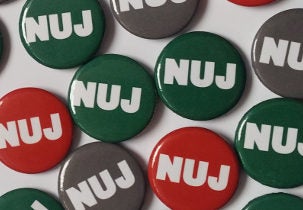
The National Union of Journalists could “go bust within a year or two” unless it increases subscriptions by up to 28 per cent over the next two years, it has said.
A motion to increase subscription rates for the union’s 23,000 paying members was due to be heard at its delegate meeting this month, which has been postponed to a later, as yet unknown, date due to Covid-19.
Professor Chris Frost, chairman of the NUJ’s finance committee, acknowledged that it is “not a good time politically” for a fees hike due to the impact of coronavirus on the industry.
But he told Press Gazette: “I honestly don’t see we’ll have any choice about pulling back from that when we eventually do have the delegate meeting.
“Frankly if we don’t get the increase we will go bust within a year or two, and that can’t happen. We would probably have to actually talk to some other unions and try and merge.”
The motion, put forward by the NUJ’s National Executive Council, says: “There is a vital need for subs to rise to reflect the increase in the cost of living and the challenges facing the union in order for the NUJ to sustain itself as an independent, vibrant campaigning trade union.
It adds that an “increased income base is critical if we’re to continue to provide the high level of support and distinct services to our members throughout the UK and Ireland” and that this would allow the union to “boost organising resources and launch new campaigns to protect journalists and journalism”.
The proposed subscription rises are as follows:
| Grade | Current monthly rate | Proposed 2020 monthly rate | Proposed 2021 monthly rate | Total % increase |
| Grade 1 (earnings up to £20,000) | £15 | £17 | £18.70 | 25% |
| Grade 2 (£20,001-£29,000) | £18 | £20 | £22.50 | 25% |
| Grade 3 (earnings over £29,000) | £25 | £29 | £32 | 28% |
One NUJ member and reporter working in the UK, who asked to remain anonymous, objected to the timing of the proposal.
“I appreciate that dues have to go up at times to pay for increased costs and pay so staff aren’t hit by the increased cost of living, but the middle of a pandemic seems like a strange time to up subscription fees,” they said.
“This could be a great opportunity to increase union membership and improve organisation in newsrooms as bosses look to cut pay -but these increased membership costs will only make it harder for us to get people signed up.”
Frost said membership has so far risen since the pandemic began, but “what it will be like in six months’ time I don’t think anybody knows”.
And despite raising the prospect of a merger, he went on: “The NUJ’s distinctive approach when it comes to supporting journalists and journalism is very important and we wouldn’t want to give that up.
“The idea of joining another union, excellent though they might be, would mean that we would not get that distinctive approach.”
If approved, this would be the union’s first subscription rise in six years.
An increase was sought at its last delegate meeting in 2018 but this was voted down after a budget surplus of £200,000 was revealed.
This surplus has been “wiped out” in the past two years as a result, Frost said.
Some of the £200,000 went towards refurbishing the NUJ’s London office to increase its value to tenants, but there are now concerns that rental income could be lost if those businesses are badly hit by Covid-19.
The union’s annual income is currently £4.71m, which is £2m less than in 2009 in relative terms, Frost said. There were around 27,000 paying members ten years ago and the union now has “far fewer” staff.
Other factors include changes to pension rules meaning the NUJ’s pension deficit payments will “significantly increase” by as much as £150,000 this year.
Another NUJ member warned Press Gazette that the union “already struggles” to engage with younger members, who could be put off by paying more.
“The NEC have good intentions (to save the union for the future) but if their best plan is to force the youngest and worst paid members to foot the bill, there will be no future for the NUJ anyway,” they said.
“This motion didn’t work two years ago and it shouldn’t work now… In these dark times, there shouldn’t be a high price for basic union representation.”
But Frost said the proposed rise was aimed primarily towards higher-paid members as it is expected that a “large number” of those on lower salaries will opt to pay only one per cent of their salaries, the minimum rate, for the first time.
The NEC is also looking at the possibility of introducing a new youth rate or a special rate for new joiners.
Picture: NUJ
Email pged@pressgazette.co.uk to point out mistakes, provide story tips or send in a letter for publication on our "Letters Page" blog
